I have had TMJ issues since around the age of nine, and have experienced anxiety issues from childhood as well. However, it wasn’t until recently that I started to wonder if the two were connected. Can anxiety cause TMJ issues?

I discovered that the answer is not as simple or straightforward as I would like. In this post, I’ll be talking about how TMJ symptoms and anxiety are connected, and I’ll share some self-care practices I’ve learned along the way to improve my TMJ symptoms.
@dinkumtribe Why I’m talking about anxiety. #mentalhealthmatters #anxiety #anxietytips #dinkumtribe_anxiety ♬ original sound – DinkumTribe ADHD family travel
Disclaimer: I am not a medical professional, nor is this post meant to be taken as medical advice. I’m simply sharing my experience as a person who lives with both anxiety and temporomandibular joint disorder (TMJ).
Table of Contents
What exactly is TMJ?
TMJ is also referred to as TMD (temporomandibular disorder). It generally refers to chronic pain that is caused by misalignment of the jaw joints and muscle tension in the jaws and surrounding facial muscles (ref: Hopkins Medicine).
At age nine, I suddenly noticed that my jaw would make occasional or clicking sounds when it moved. The sound was especially noticeable when I was chewing. The popping sound didn’t cause me any pain so I didn’t even mention it to my parents.

I also started to experience regular headaches at around age 9. I never connected the two symptoms (headache and jaw popping), but both are common symptoms of TMJ.
What causes TMJ?
According to the Mayo Clinic, TMJ disorders may have several different causes, and it may be difficult or impossible to determine what the direct cause is. However, there are several risk factors that can increase the possibility of a person developing chronic TMJ disorder. Risk factors include:
- Arthritis
- Trauma to the face, head or neck
- Family member who has TMJ issues
- Jaw clenching and teeth grinding
I was diagnosed with TMJ at a routine dental visit in my late 20s. The dentist had a standard intake form that asked questions about TMJ problems, such as grinding teeth, headaches, and so on.
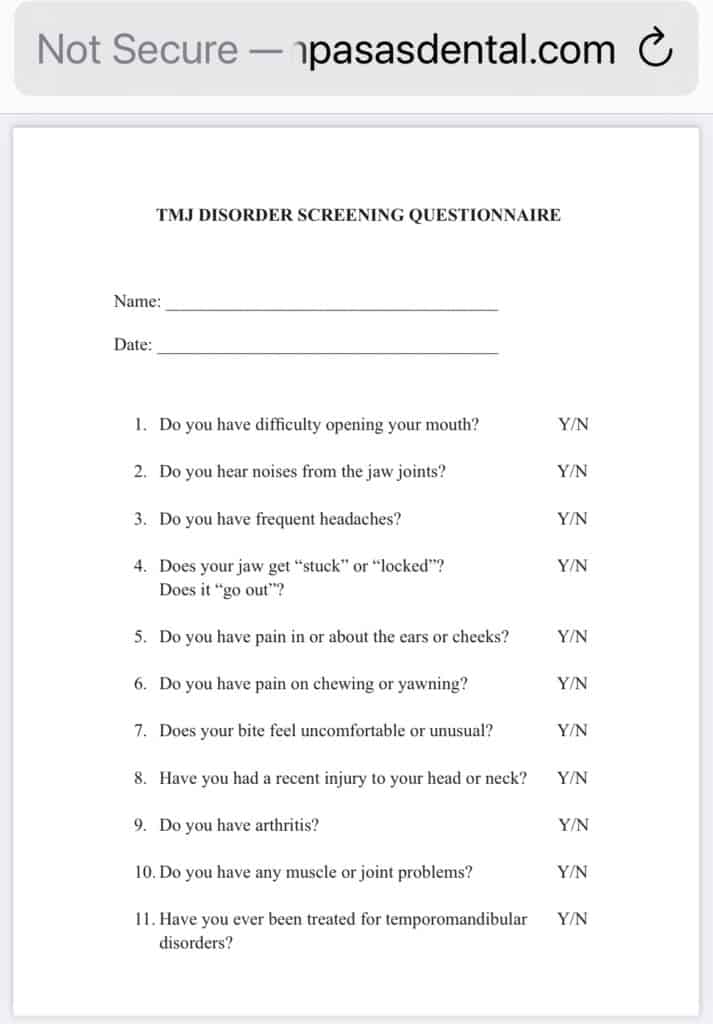
I answered “yes” to nearly all of the TMJ symptoms listed, and the dental specialist confirmed the TMJ diagnosis.
What are symptoms of TMJ dysfunction / disorder?
TMJ dysfunction occurs when the jaw joints and jaw muscles are not working together the way they should. Usually, opening your mouth and chewing are activities that your jaw does smoothly and without pain.
However, in a TMJ disorder, the jaw joints may pop in and out of place (dislocate) when you chew, yawn, or close your mouth.
The following symptoms can occur with TMJ disorder:
- Jaw pain or jaw tenderness
- Headaches
- Pain in facial muscles, particularly on the side of the face and head
- Ringing in the ears
- Limited range of motion in the jaw (in severe cases the jaw may lock completely)
- Dizziness
- Pain in the neck and shoulder muscles
- Teeth not fitting together properly, or a change in how the teeth fit together
Personally, I’ve experienced nearly all of these symptoms at one point or another in my life. Thankfully I haven’t had my jaw lock, but I know several friends with TMJ disorders who have experienced that.
What’s the connection between anxiety disorders and TMJ?
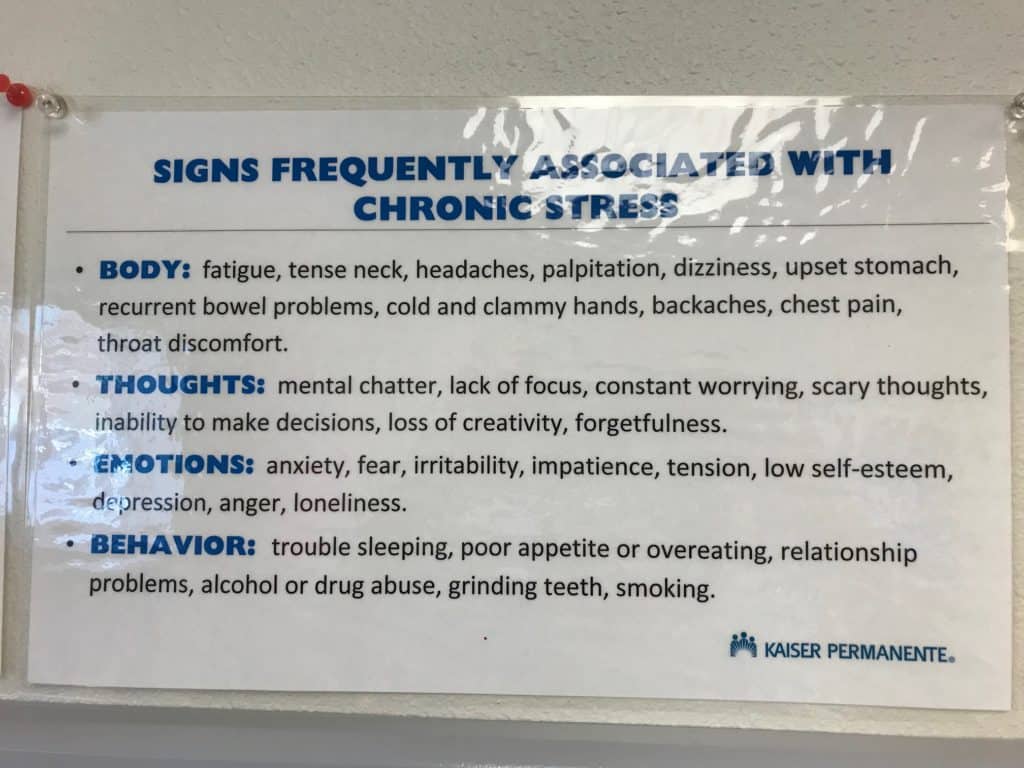
Many people naturally clench their jaw or grind their teeth when they experience stress, whether pain, anxiety, or anger. If you’ve ever tensed up before a medical procedure or an injection, you’ve probably noticed this. Often, stress causes people to grind their teeth even while they’re sleeping and unaware of it.
Chronic stress increases the risk of anxiety disorders, as well as anxiety symptoms. The physical symptoms that occur along with anxiety and/ or panic attacks can severely impact daily life.
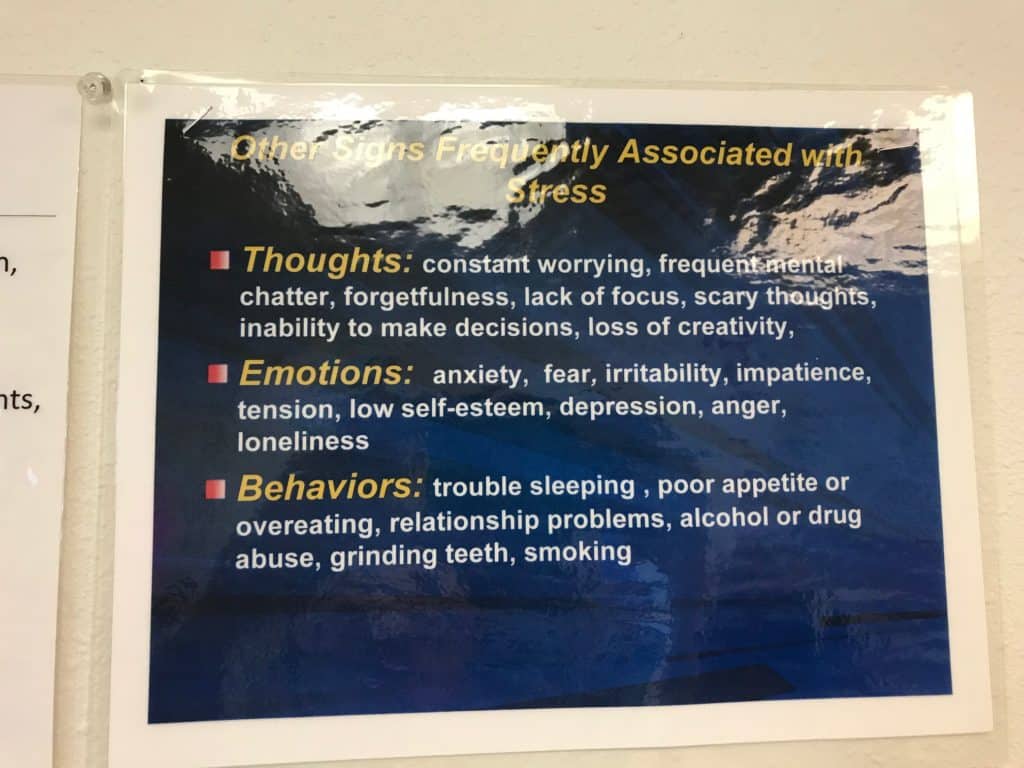
One of the common physical symptoms of anxiety and prolonged stress is muscle tension and clenching/ grinding teeth. Over time this can lead to TMJ issues, or can exacerbate an existing TMJ disorder.
@dinkumtribe Loneliness is so harmful to the body and mind, yet our society encourages independence from a very young age. #motherhunger #bookclubtiktok #bookclubchallenge #lonelinesssucks #lonelinessepidemic #healthissuesmessage #missingmom❤️ #mentalhealthtok @DinkumTribe ADHD family travel ♬ original sound – DinkumTribe ADHD family travel
Can anxiety cause TMJ?
Anxiety isn’t a direct cause of TMJ. However, many people who experience anxiety and are already prone to TMJ, may start to develop TMJ issues as a result of anxiety or stress symptoms.
Looking back on my childhood, I noticed that some of my anxiety symptoms (such as biting my nails, and headaches) were present from a very young age. However I wasn’t diagnosed with an anxiety disorder until just a couple of years ago. In hindsight, it seems likely that my anxiety contributed to my TMJ dysfunction.
@dinkumtribe My experience with anxiety as a child/ teen. #childhoodanxiety #anxiousteens #dinkumtribe_anxiety #anxietyawareness ♬ original sound – DinkumTribe ADHD family travel
From age 11 onward, I had chronically tense shoulders, neck, and head, in addition to the frequent migraines. The pain was worse during stressful situations or life events.
When I got married, Brian made the observation that I was grinding my teeth in my sleep. Then when I learned about TMJ, I started to notice how often during the day I was clenching my jaw— sometimes for hours at a time!

What treatment options are available for TMJ?
There are many different options available to treat TMJ problems, ranging from good self-care practices, to the more extreme options like TMJ surgery. Your first step in determining a TMJ treatment plan should be a visit to your healthcare provider or a dental specialist.
I found that most of my TMJ pain was able to be managed well with lifestyle changes, stress management, and some other noninvasive methods. Here’s a list of some of the things I’ve done to improve my TMJ symptoms.
Reduce jaw tension and jaw clenching
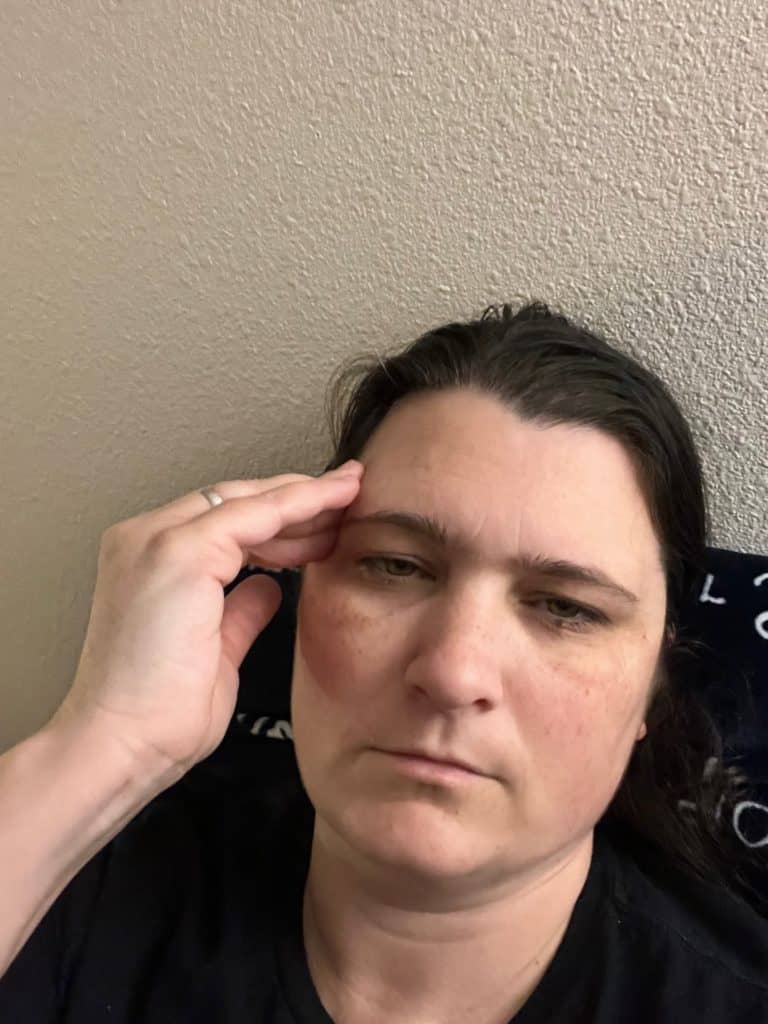
I remember driving home from the dental appointment when I first learned about TMJ, and suddenly noticing for the first time that I had my jaw clenched during the 20-minute drive home!
Over the next few weeks and months, I started to pay attention to how often I was clenching my jaw. Then I practiced consciously relaxing my jaw and facial muscles.
This simple change significantly reduced the number of headaches I was having. It also resulted in less popping and clicking in my jaw.
Avoid excessive chewing

Making this change wasn’t fun because I was used to chewing mint gum throughout the day. However, one easy way to minimize pain in the jaw is to chew less often. I switched to mints that I could suck instead of chewing.
I also began avoiding foods that required a lot of chewing or that were tough. That included my favorite candy (Skittles) and other favorites like crusty bread, caramels and tough meat. Choosing soft foods more often has meant less pain overall.
Straightening teeth and correcting bite
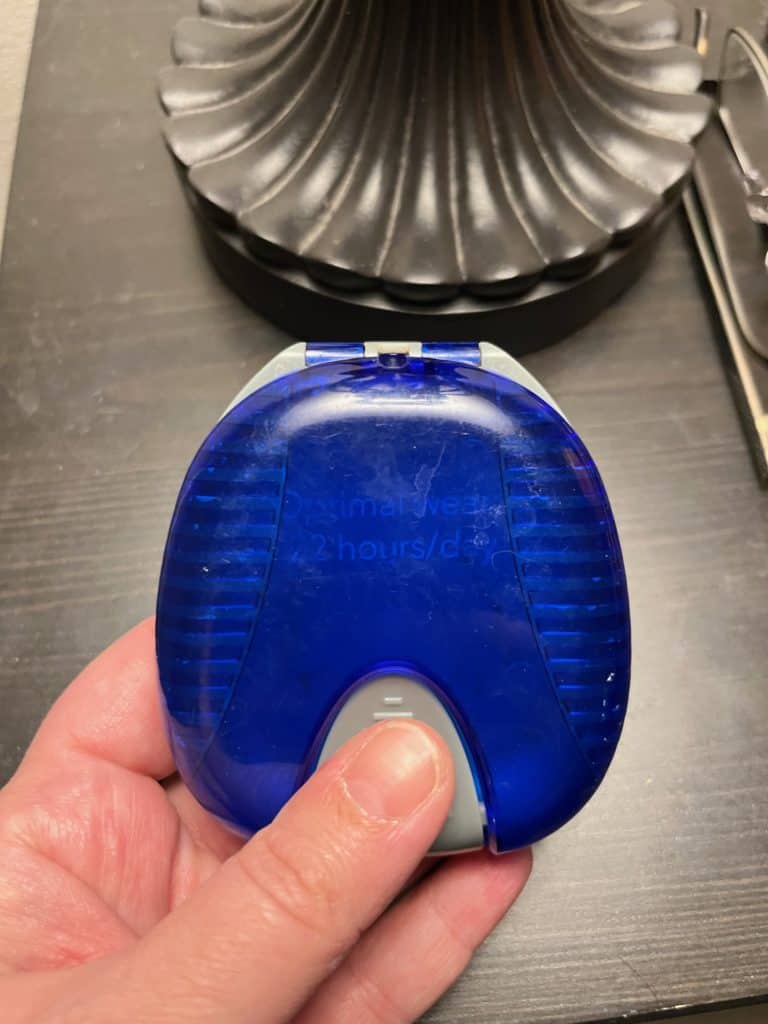
We decided to use Invisalign because as a busy mom I needed something that was going to be low maintenance. I didn’t have a serious misalignment, but it was enough to cause issues.
After I finished the Invisalign treatment, I only had clicking and popping sounds on one side of my jaw, instead of both sides.
Using night guards
Getting a night guard can be a big help for TMJ sufferers, since many people who have TMJ grind their teeth at night while asleep. One of my friends had an oral appliance fitted to her specifically— it relieved nearly all of her TMJ pain. I haven’t gotten a mouthguard yet, but it’s my next treatment to try.
Stress management

If you find that you have stress-induced TMJ, like I do, effectively managing your stress should be a key part of your treatment. Getting regular exercise, eating well, sleeping well and generally taking care of your physical health can make a big difference in reducing the symptoms of TMJ.
Treating your anxiety
Stress, anxiety and TMJ pain can become a vicious cycle where stress causes anxiety, anxiety causes tension and TMJ pain, and pain increases stress and anxiety. Treating all three is the best way to find relief.
I found significant relief from TMJ issues by getting appropriate treatment for my anxiety symptoms. I’ve talked about the importance of relaxation techniques (and included examples) in my post on self-care for anxiety.
@dinkumtribe Anxiety tips series, part 1 : what are grounding exercises? #anxietyrelief #anxietytipsandtricks #grounding #dinkumtribe_anxiety ♬ original sound – DinkumTribe ADHD family travel
My doctor prescribed an anti-anxiety medication to help with my migraines and panic attacks. Taking this medication reduced my anxiety levels to such a point that I rarely have panic attacks any more, and my migraines are less frequent.
TMJ surgery
Some people do eventually require surgery for TMJ/TMD disorders. However, for many people, surgery doesn’t necessarily bring relief, so it’s usually reserved for the most extreme cases.
Improved quality of life

It’s worth pursuing treatment for anxiety and TMJ. As I’ve tried a variety of options, each treatment has resulted in small improvements. Now I’m at the point where jaw pain is minimal, and my anxiety is well-managed.
If you suffer from TMJ issues, consider whether anxiety may be impacting those symptoms. On the other hand, if you have anxiety and one of your symptoms is headaches or muscle tension, consider looking into whether TMJ pain is a factor.
©️Copyright Jennifer D. Warren 2023.
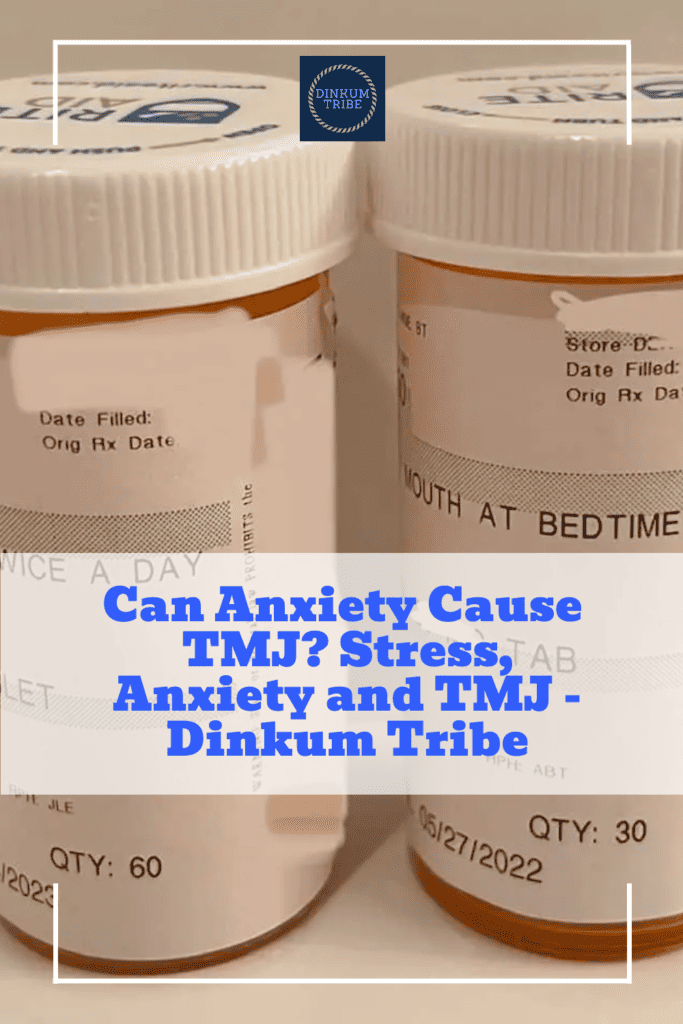
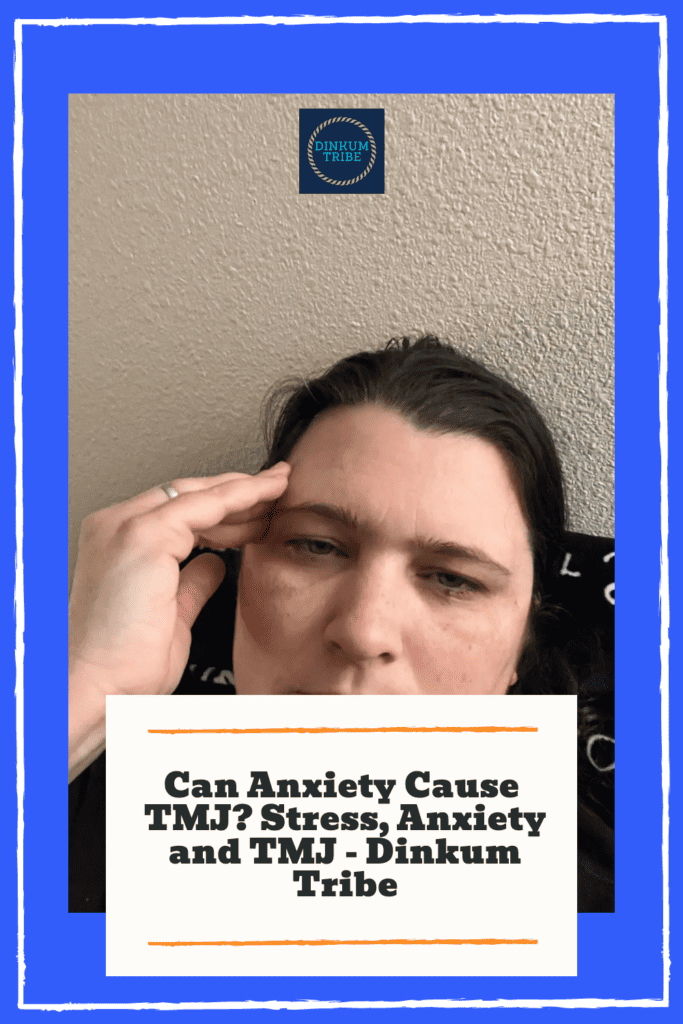
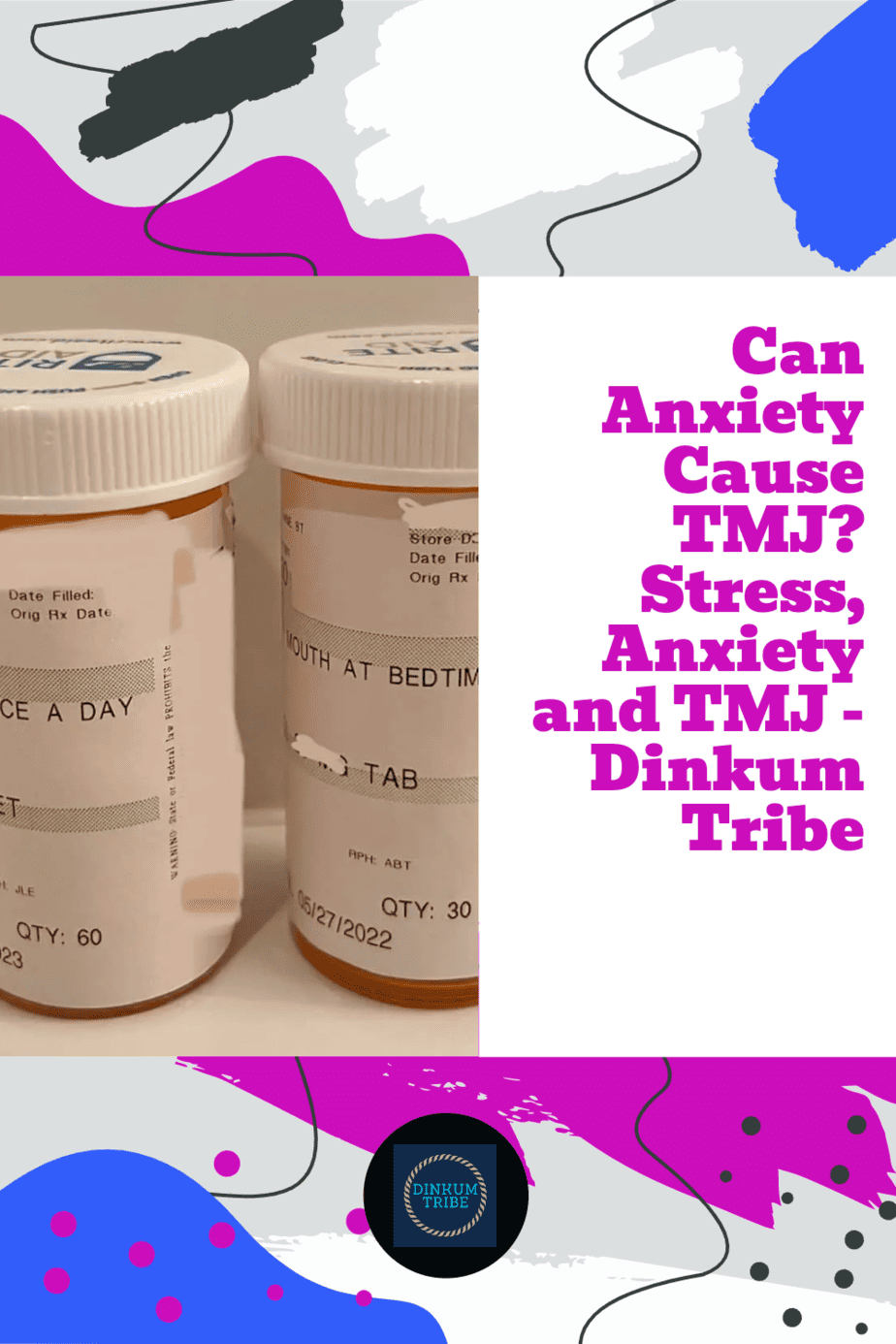



Comments